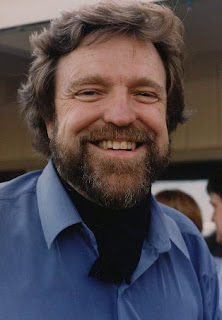If you're not lost,
you're not much of an explorer.
I'm a member of
that half of the human race which is inclined to divide the human race into two
kinds of people. My dividing line runs between the people who crave certainty
and the people who trust chance.
We cannot separate
the air that chokes from the air upon which wings beat.
I have always felt
that no matter how inscrutable its ways and means, the universe is working
perfectly and working according to a greater plan than we can know.
--- John Perry
Barlow
I suppose for many the name of John Barlow will not mean
much. For legions of Deadheads though
the name is commonplace. Barlow spent
many years as a lyricist for the Grateful Dead, working mainly with Bob
Weir. But Barlow also had many outside
interests as a rancher, a politician and an activist, most notably in his work
for a free internet. As with most of the
Dead, he was an independent thinker. If you
listen to any interview with him in Dead related videos, you were just as
likely to hear a contrarian point of view of their history. He will be missed.
I want to reproduce here something that he wrote when he
discovered at a certain age that he was an adult now and pondered what that
meant. Here are his 25 Principles of
Adult Behavior:
·
Be patient. No matter what.
·
Don’t badmouth: Assign responsibility, not
blame. Say nothing of another you wouldn’t say to him.
·
Never assume the motives of others are, to them,
less noble than yours are to you.
·
Expand your sense of the possible.
·
Don’t trouble yourself with matters you truly
cannot change.
·
Expect no more of anyone than you can deliver
yourself.
·
Tolerate ambiguity.
·
Laugh at yourself frequently.
·
Concern yourself with what is right rather than
who is right.
·
Never forget that, no matter how certain, you
might be wrong.
·
Give up blood sports.
·
Remember that your life belongs to others as
well. Don’t risk it frivolously.
·
Never lie to anyone for any reason. (Lies of
omission are sometimes exempt.)
·
Learn the needs of those around you and respect
them.
·
Avoid the pursuit of happiness. Seek to define
your mission and pursue that.
·
Reduce your use of the first personal pronoun.
·
Praise at least as often as you disparage.
·
Admit your errors freely and soon.
·
Become less suspicious of joy.
·
Understand humility.
·
Remember that love forgives everything.
·
Foster dignity.
·
Live memorably.
·
Love yourself.
·
Endure.
The only point at which I might have some contention is “Reduce
your use of the first personal pronoun.”
Now I assume I know what he meant by that. In the context of overly focusing on your
personal identity issues, I can agree. But in another context, I do not.
In the collective field, statements of universal truths
are rampant. These statements are often
taken as axioms. In the old paradigms,
these are perfectly acceptable. But are
there really truths which are applicable to everyone? Are we entering an evolutionary stage where
personal truth is paramount? I don’t
really want to get deep into that but suffice to say that this isn’t the same
as anarchy or relativism, where whatever I want or desire I can or should act
on.
In the Design world, we are essentially guided to what is
correct for us by our unique Inner Authority.
This isn’t a mind function. We don’t
get to create, intend or guide what our Authority communicates to us. We have no choice in that matter. We can only surrender to that guidance. This isn’t really much different from a lot
of systems except for the aspect of unique personal Authority.
But there is a price for this uniqueness. First is that we must live in absolute
integrity with that Authority. We cannot
use it as a strategy to get what we think we want. It requires surrender to Life. Another price is that we cannot know the
motives and reality of others. We have
to ask the other to find that out. It follows
also then that we really can only speak from our own experiences. When all participants live as their true
selves then true communication can take place.
Thus it follows that indeed we do need to use the personal pronoun, the “I”. Again, this is not the “I“ of ego or of
identity. But it does point to the
experiential processes of the individual which must be authentic. I can really only know truth as I experience
it through my design, my limitations.
Through sharing in its myriad aspects, we can arrive at some conclusions
of the wisdom of our past experiences and forge an experimental pattern to
guide the collective to the future.
I have seen where the wolf has slept by the silver
stream.
I can tell by the mark he left, you were in his dream.
Ah child of countless trees, ah child of boundless seas.
I can tell by the mark he left, you were in his dream.
Ah child of countless trees, ah child of boundless seas.
Flight of the seabirds
Scattered like lost words,
Wield to the storm and fly.
Fare thee well now, let your life proceed by it's own design.
Nothing to tell now, let the words be yours, I'm done with mine.
Scattered like lost words,
Wield to the storm and fly.
Fare thee well now, let your life proceed by it's own design.
Nothing to tell now, let the words be yours, I'm done with mine.
--- Cassidy, lyrics by John Barlow
